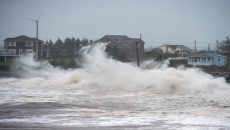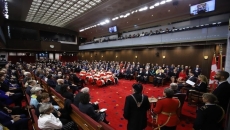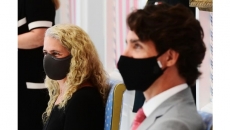Despite the bitter partisan divide racking U.S. politics, there is one thing both Republicans and Democrats living in Canada agree on when it comes to November's presidential election — the need for American expats here to vote.
Roughly 620,000 Americans who are eligible to cast ballots live here but fewer than 33,000 of them actually voted four years ago, U.S. data indicate. Activists from both parties say those uncast ballots could have made the difference in the bitterly fought 2016 election that saw Donald Trump become president.
Mail-in ballot in hand, Graeme Wagner, 35, an American-Canadian lawyer in Toronto, said he was voting this year for the first time since coming to Canada as a student in 2004. He's doing so, he said, even though his vote will likely have little impact in the solidly Democrat state of Massachusetts, where it will be counted.
"I'm not doing my civic duty if I don't vote anyhow," Wagner said.
For Wagner, Trump's turbulent tenure was the main motivation for making his voice heard this time. Trump, he said, has been dragging the U.S. down.
"Things have definitely taken a negative turn in the last couple of years," Wagner said. "People are kind of over-hyping everything when it comes to this election but in some ways, they're not wrong."
While each state has its own peculiarities, expat voting typically entails registering, requesting a ballot, then mailing it in. Deadlines vary. In some states, the deadline for getting the process underway is Sunday.
Mark Feigenbaum, a tax lawyer and chairman of Republicans Overseas Canada, said his organization was doing what it can to get the voting message out.
"It's hard, especially in Canada, because we don't know where everyone votes. Some people are voting in states that are really important," Feigenbaum said. "Hopefully, vote the way we want but make sure at least your voice is heard."
Similarly, Democrats Abroad have been pressing to get expats in Canada to exercise their right and vote for their preferred candidate, former vice-president Joe Biden. Enthusiasm to do so, a spokeswoman said, has increased significantly since 2016 and especially this year.
"There was a certain complacency because no one thought it was possible that President Trump might win," Dianna English said of low turnout from Canada last time.
"We've seen what four years of President Trump is like. We know the damage that's been done, the lives that have been lost. The chaos that has been sown. There's a real sense that we can't endure another four years of this."
Feigenbaum would beg to differ. Rather than covering the policies voters should be weighing in on, the media have been distracted by non-issues such as how much income tax the president paid in recent years, he said.
"I'm hoping that the issues stay focused on: the economy, governance and trade and all that sort of thing," Feigenbaum said. "The economy for the U.S. is actually doing fairly well, all things considered."
While the COVID-19 pandemic has largely precluded in-person gatherings, the various organizations are doing phone- and mail-outs and even planting lawn signs. The U.S. embassy and consulates are doing what they can. The Toronto consulate, for example, is offering to deliver filled-out ballots to the U.S. for free.
Expat Americans can visit https://www.fvap.gov/ to find out what they need to vote from Canada.
One state Democrats in Canada are targeting is Michigan, which Trump won by a scant 11,000 votes in 2016. The party estimates at least that many Democrat Michiganders live here, many in border cities such as Windsor, Ont., where Democrats Abroad are running ads in the media and on buses.
"Would that be something if Americans living in Canada could decide the next president?" former U.S. ambassador Bruce Heyman said this week.
Trump has lashed out at mail-in balloting, suggesting without evidence and despite denials from legal authorities that it's open to large-scale fraud. He has refused to say outright he will accept the results if it appears he lost, a decision that could take weeks or even months after the Nov. 3 voting day.
The rhetoric has alarmed many Democrats. Wagner, however, is more sanguine about the possibility of Trump's refusing to leave the White House if Biden wins.
"It's a little bit over-hyped on that one," he said. "The Americans would never accept that. If you lose, you lose."






.jpg)